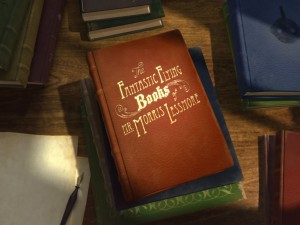by Jas Faulkner
[youtube http://www.youtube.com/watch?v=JL2KOcWGn-o&version=3&hl=en_US&rel=0]
To experience a William Joyce book is the enter a place where things tend to fall together in a fashion that is both charmingly out of step with modern sensibilities and yet imbued with enough emotional currency that his words and images resonate with the most hard-bitten contemporary reader. His answer to our frantic digital age is found in the elegant mechanics of a clockwork world that requires the intervention of a human hand in order to keep working in its own orderly/disorderly fashion.
It has been proven time and time again that there is a type of writer who is informed as much by his or her physical location as they are by the emotional and intellectual landscape in which they came of age. This has been demonstrated time and again by Wallace Stegner’s devotion to the American West, Carolyn Chute’s Maine, and Robertson Davies’ Toronto as well as the writers who tend to spring up thick as hops from the American South. Joyce is, quite happily, one such author. The sensibility that drives his creative choices may seem to come from some odd, unidentifiable to anyone who hasn’t spent time in Shreveport, Louisiana. Shreveport and neighboring Bossier City are sometimes decried as places that time has forgotten. In truth, they are simply locations where people have decided not to fix what isn’t broken and incorporate it in the best of what is to come.
It is in this sweetly quaint, clockwork world that Joyce has set this animated short. His protagonist is comfortably situated on a balcony loaded down with books in a place that looks a little like New Orleans and maybe a little like older sections of downtown Shreveport. He watches people mill about on the street below and scribbles down what looks like a typical Joyce story in a blank journal. It is then that a storm, something that is equal parts Wizard of Oz and NOAA bulletin destroys his city. The aftermath is chilling. People wander dazedly among the destroyed buildings, a man rides by on a bicycle, weeping, and in answer to this, Joyce’s hero, Morris Lessmore, finds solace in a life devoted to books. The books in Joyce’s world live in a figurative and literal sense. They are meant to be experienced, cared for, and shared. In turn they give comfort. They spark the soul and create a sense of connection with the rest of humanity and ultimately, a sense of purpose for a greater good.
What Joyce has conveyed in a little over fifteen minutes is how books -or really the written word- nurtures our better selves. Search as we might through archaeological evidence or forensic reconstruction for some connection to those who are removed by dint of geography or temporal circumstance, the only sure way to communicate over space and time was, is, and will always be in the plastic expressions left by hearts, hands, and minds of those who, in the words of playwright Sam Shepard, “can’t not do it”. Those glimpses connect us. They make the world make sense. They remind us of the best and worst and ultimately the fragile beauty of what it means to be human of being human. They are the best magic we can hope for.
The short film embedded above conveys all of that. It was created by someone who creates books, loves them and wants to see that passion passed on to the next generation. It is both a nod to Goethe’s sweet serenity and a call to a mission that might just save us, as it has time and again over the centuries.


I love, love, love this! Enchanting! Reminds me that I live and work in a magical place–my own bookstore!
Glad you like it! The magical aspects of writing, reading, and caring for the artifacts that enable the connection are what I hope people get from this film.
thanks you for this sharing, I want to learn magic. it cool